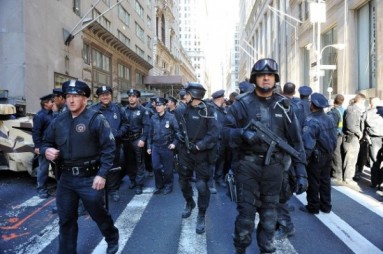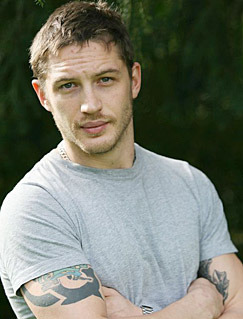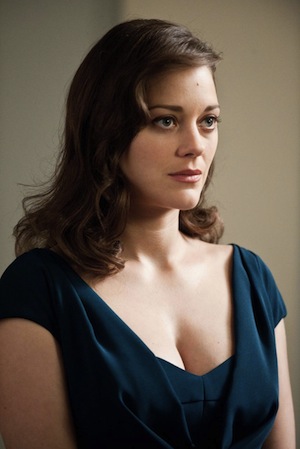The Dark Knight Rises is not about Occupy Wall Street, even though it does have a five month anarchist occupation of New York City, which lasts into the winter until a huge phalanx of NYPD officers flood into lower Manhattan and pound the crap out of them. It is a movie that works very hard at not being about Occupy Wall Street, in fact: it fills the screen and narrative arc with all sorts of bells and whistles, bloating its running time way beyond necessity, and generally wearing you down with all sorts of things that are not Occupy Wall Street until you don’t notice anymore that it’s all the fuck about Occupy Wall Street. I mean, for fuck’s sake, Bane and a bunch of his goons literally Occupy Wall Street at one point, and then they lead a leaderless revolution of wealth redistribution and general assemblies, that they apparently hope will by example (mediated through mass media) be replicated across the country. I think Batman even subpoenas Malcolm Harris’ twitter feed at one point.
“It’s no exaggeration to say that the “Dark Knight” universe is fascistic (and I’m not name-calling or claiming that Nolan has Nazi sympathies). [It has a] vision of human history understood as a struggle between superior individual wills, a tale of symbolic heroism and sacrifice set against the hopeless corruption of society. Maybe it’s an oversimplification to say that that’s the purest form of the ideology that was bequeathed from Richard Wagner to Nietzsche to Adolf Hitler, but not by much.
For the moment, let us skip lightly past the delightful spectacle of Douthat being scandalized at ideological movie reviewers, and take a look at his argument that the movie’s message instead reflects a “quiet toryism” (a term he hilariously gets from the ideology-free pen of the Weekly Standard’s movie critic). To open up space between what he sees the movie as being and the “fascistic” Batman of ideological crazies, Douthat tells us that this is what a fascist The Dark Knight Rises would look like:
[A] genuinely “fascistic” Batman movie would have concluded with the Caped Crusader using the chaos wreaked by terrorists and revolutionaries as a justification for setting aside Gotham’s existing political institutions and ruling the city by fiat, with Wayne Enterprises merged with City Hall, the bat signal emblazoned on every public building, and the collective will of the public channeled through the superior individual will of Il Batman (and his successor, Der Robin, presumably).
On the one hand, this is actually not that far from the sort of ambition that the Bat man has at various points. For one thing, the movie concludes with a Batman statue going up in City Hall and a succession system in place to keep creating new Batmans. Bruce Wayne might leave the city, but Batman will haunt it forever; the implication of the Batman Laws are that the culture built around the lies of Harvey Dent has been replaced by something more substantial, even permanent. This, it would seem to me, is very much like what Douthat said a “genuinely fascistic Batman movie” would conclude with, no?
More broadly, let us never forget that Wayne Enterprises is (among other things) a military contractor -- emphatically putting the hyphen in military-industrial complex -- and the whole point of the Bat man in the Nolan movies is to mold the collective will of Gotham residents, exactly through the kind of mass spectacle that Douthat attributes to real fascism. Presumably the oh-so-clever reference to “Il Batman” and “Der Robin” (because German and Italian are fascist languages, get it?) is meant to remind us that because Batman is American -- uniquely so, in this movie, in fact -- he obviously can’t be fascist. Finally, the Bat man is also fascist if extrajudicial killing -- cleansing the republic by restoring the kind of order which democracy can no longer provide it -- are fascist. Your definition of fascism may or may not include secret police in the night, but I suspect that only if you think FDR and the New Deal are the ne plus ultra of actually existing fascism -- and you forget that secret police are kind of an important part of what made fascism a no good, very bad thing -- will it seem like Batman is anything other than at least Fascist-curious.
For example, as Scott J at the “Occupied Oakland Tribune” pointed out yesterday, the logic of Batman’s counter-revolutionary purpose in this movie points inexorably towards one of true fascism’s favorite pursuits: the mass killing of Marxists, union leaders, and dissidents. Everyone always forgets that secret police love nothing more than throwing labor agitators in jail or in shallow graves, but the story of 20th century authoritarianism is usually left strategically incomplete with the omission of all those hundreds of thousands of leftists who were targeted for liquidation by various fascist regimes, from Nazi Germany to Suharto’s Indonesia and Ba’athist Iraq, and many more. One of the first orders of business for an repressive authoritarian right-wing regime, historically, is to start rounding up the leftists.
As Scott observes, however, “[h]aving Batman battle a reluctant Gotham while he unredistributes Bruce Wayne’s wealth would have been far more interesting but ideologically far too complicated.” It is a measure of Hollywood/Nolan’s chicken-shittedness -- in that they love the spectacle of reactionary counter-revolution but don’t have the heart to show us dead leftists -- that the entire 5 month period of “occupation” is resolved with barely a trace of lingering hard feelings, that after 5 months of dividing Gotham between collaborators and the resistance, everybody’s happy to just call it a day and worship the bat statue or something. The thing that made the first two movies good was the way Bruce Wayne became the terrorist and Batman became both torturer and operator of a mass surveillance system; it was exactly the point that in fighting the villain, he became the villain. If this movie had any guts, it would have -- and almost did -- show us Batman fighting against the people of Gotham: as they fall under the spell of Bane’s message of radical wealth redistribution, and as they turn against what used to be the status quo, the only thing Batman would find himself able to do is kill the bejeezus out of whole bunches of them. It mostly pulls back from that; the people we see the cops beating up are not citizens, but a hyper organized criminal conspiracy.
As Abigail Nussbaum perceptively notes
“Bane claims to be acting on behalf of the city's underclass, and establishes a policy of violent persecution against the upper classes...we are kept entirely in the dark on the question of how the people of Gotham feel about this. Do they support Bane? Do they oppose him? Do they think he has the right idea but the wrong methods? Are they, as seems most likely, divided between these options according to their social status in the pre-occupation world? The Dark Knight Rises ignores all these questions...Gotham spends months under Bane's rule--months that you'd expect to have a profound impact on the social, psychological, and cultural life of the city--but upon his defeat all we see are its citizens stepping out of their homes (as if they'd spent all that time indoors), ready to resume their lives as if the very fabric of their society hadn't been ripped to shreds. What's interesting is that the Nolans had an opportunity here to reinforce their authoritarian message and show why Batman is necessary--because when stripped of both their white knight, the lie of Harvey Dent, and their dark knight, the citizens of Gotham turn to Bane, a false savior. The film could have shown us Gothamites turning on one another, informing on their neighbors and signing up to do Bane's bidding--the nightmare scenario that justified Batman's choice to take responsibility for Harvey Dent's crimes. Instead, the Nolans prefer to serve up a fantasy of docile, patient goodness, of a populace content to wait for Batman to save it without doing anything--good or evil--on its own behalf.”
With this in mind, I’d suggest that the distinction which Douthat works so hard to draw -- between “fascism” and “quiet Toryism” -- is largely one of degree and extremism, the distinction between a reactionary project that uses murderous extralegal violence to maintain what the order of the status quo, and the conservative project that doesn’t have to (though, of course, quite a few Tories have historically suported Fascism, too). The speed and ease with which the United States has adapted to an era of normal, routine, and banal extra-judicial killing, after all -- yesterday was just another “Terror Tuesday” at the White House -- only demonstrates how latent the fascism really is in most conservatives (and indeed, in most so-called liberals). All you need is for it to become manifest is for one of your own to order the death of all “military-age males” in a particular area, though it also helps if those people are racially marked. If that sort of thing is not at least a close relative of fascism, then the word means nothing.
So I’m not interested in calling The Dark Knight Rises names; I’m interested in understanding what it is. And what it is, it turns out, is an effort to evade the consequences of its own parable, just as conservatives never want to remember how closely aligned their tradition has been with actual fascism. They want to tell the story of a cold war won by the example of Ronald Reagan’s resolute command to “Tear down that wall!” and the accompanying fantasy that all you need is a hero, unswerving will, and symbols. They don’t like to remember the liquidation of half a million Indonesian communists in 1965-66, or the fact that the American embassy in Jakarta supplied Suharto’s secret police with a list of names. The cold war was not won by symbols alone; the US kept Latin America free of communism, for example, by sending money and guns to thugs with death squads.
* * *
But let’s get back to talking about the movie. Or, rather, to talking about how we talk about the movie. After all, most of the people who talk about the movie's politics do so with a rather -- let me be diplomatic here -- un-theorized sense of what it means for a movie to be "political." But they do this because, while all movies are political in a certain categorical sense (since everything is political), most movies are not campaign commercials, or at least the interesting ones aren’t. The fact that people of different ideological persuasions can watch the same movie and get different things out of it is an intrinsic part of what movies are. So in what sense can you really say that a movie is "conservative" or "liberal"? A more conservative movie you could not want than Act of Valor, I put it to you, and yet I have never seen a movie that made military life and death look less appealing than that one.
As I said, I liked the second Batman movie because of the extent to which it was genuinely difficult to say whether the movie was really on Batman's side, whether he was really “good.” It wasn't just that the Joker made a good case (though he did), it was that the joker was indistinguishable from Batman and inconceivable without him; the Joker was Batman's blowback, or if we want to tag in Zizek for a second, he was Batman's obscene supplement, the illegality that makes law possible, the perversity that makes beauty imaginable, and the chaos without which order can't even be a thing. In other words, just as the Joker was unthinkable without Batman, the movie dared to suggest that Batman might be unthinkable without the Joker. In such a movie, “good” is polluted by its complicity and dependence on “evil,” to such an extent that it cannot be simply “political,” or at least not in the sense which many reviewers meant; it cannot be said to “reflect a message,” because the very manner of that message’s telling turns it inside out on itself.
This is not to say, of course, that a movie doesn't put limits on our ability to read it in different ways. It manifestly does; The Dark Knight Rises is not, I can say with full confidence, a critique of Bain Capital. Movies are broadly polyvalent in some respects and they are more narrowly polyvalent in others, which means that some kinds of readings are plausible (“Batman is a fascist!”), and some are not (“Bane is Mitt Romney!”). So the way you figure out where the limits are is by looking at what ends up on the screen versus what doesn't, the way the movie starts with a range of conceivable narrative choices and selects from them. To put this another way, a movie's politics are not to be found in the material of the narrative itself, but in the constraints which the material onscreen puts on the kinds of narratives we can tell about it. Certain stories are plausible, and others are not; certain modes of reading and identification become plausible while others get shut down.
So is it “liberal”? Is it “conservative”? Both, a little. But more importantly, “liberal” and “conservative” are already both modes of narrative constraint, political just-so stories that define the limit points of what is politically thinkable and narratable. And by narrating the movie in the space between these two ideological poles, as the material of the film suggests we do, we descend into a political reality in which there is nothing but the incredibly narrow space separating liberal from conservative, a world in which there is no alternative. There is enlightened liberal capitalism of the Keynesian New Deal variety and there is the Hobbesian world of predatory Ayn Rand capitalism. This restaurant serves both kinds of Capitalism, the kind with “rights” on the side and the kind with “liberty” on the side.
This point is important because, of course, there are two programmatically disavowed alternatives in play: leftist revolution and reactionary fascism. And not coincidentally, these are the two obvious narrative possibilities which, by all accounts, should be in play, but aren’t: the latter because the cops (and Batman too) are essentially selfless, modest, and recoil from unnecessary violence; the former because the mass population of Gotham not only lacks a political consciousness but barely even exists at all.
After all, one of the most curious things about this movie -- ostensibly about revolution and counter-revolution, and even somewhat shamelessly (if rather hopefully) based on A Tale of Two Cities -- is the way the Batman universe has so little room for real class antagonism or the notion of a structural crisis in capitalism. There does seem to be some vague mumbling about poverty in Gotham -- an orphan says that there might be work in the sewers, implying that economic despair leads Gotham’s underclass to join up with Bane -- but this doesn’t really wash, and not only because the economy is clearly less of a problem for this kid than the fact of being an orphan in an orphanage. Do we see any real suffering in Gotham? I’m trying to remember a single homeless encampment, home foreclosure, or true picture of human poverty, and I find that I can’t. This may be because it was there and I forgot it -- having paid more attention to a cockamamy subplot about whether or not Bruce Wayne will go to a charity ball or something -- and then again it may be because the movie is clearly not interested in giving the people of Gotham any real motivation to rebel against the status quo. In the Batman universe, crime just is -- for no other reason than criminals just are -- and that underdetermination has, as its consequence, the evacuation of any possibility that economic despair (or any other “empirical” factor) might be a driving force for social disorder or open revolt. The only thing to do with criminals is to lock them up, forever.
The movie’s disinterest in the existence of this technology -- and even in making much of its transformative capacity -- is not only scandalous, it’s revealing. Energy is, at the end of the day, the limit point of nearly every human endeavor, and industrial society is built on the exploitation of carbon, first coal and then oil. Virtually everything about modern society -- its contents and discontents -- is a function of how we have been made as a carbon civilization, and by the kinds of distributive networks that rise up alongside it. But in a world where a cold fusion energy has been invented, wealth inequality cannot be the real problem, and class no longer even makes sense. Think about this for even two seconds -- which is more than the movie does -- and you’ll see what I mean: if you have an infinite energy supply, the distribution calculus is no longer zero sum; the wealth of the rich is no longer a proportion of a limited total -- such that it could be too much -- but is now a fraction of infinity, which is also infinity, and so is the remainder left over for the poor. We’re now in Peter Frase territory.
And yet, even though he’s just solved the most basic problem of human economic existence forever, Bruce Wayne mothballs the entire project from before the beginning of the movie for reasons that don’t even make a little bit of sense: because the device could be turned into a bomb. #um #whatnow? As if Gotham exists in a world where nuclear bombs don’t already exist? Seriously, explain to me how that argument makes any sense at all; how do you decide not to hook up the “end-the-problem-of-material-want-forever” machine because someone might use it to re-invent the nuclear bomb? You may say: “Aaron, you’re taking this movie too seriously; the cold fusion whatsit is just the movie’s unobtanium, the MacGuffin it needs to get the plot moving.” And of course, you’d be right. My point is that the movie’s disinterest in thinking about what a technology like this one would mean is the substance of its politics, a categorical refusal to think about economics.
In my humble opinion, this act -- this decision to not end poverty because you might release a weapon into the public sphere -- demonstrates the real driving force for the movie’s morality, sense of history, and its understanding of civic virtue: the violence within, which must be contained. On the one hand, to say that we could solve all problems of human need and want, but we won’t, because it might become a bomb, is to assert that inequality is not what creates the specter of violence (it’s also, oddly, a lot like the argument that “people don’t kill people; guns kill people!”). The threat of violence is prior and separate from complaints over inequality, however much they might claim to motivate it. And indeed, this was the lesson of the first movie, the lesson Bruce Wayne learned from the death of his parents: you can build an awesome Keynesian super-train and fix Gotham’s economy forever, but some random street criminal will still murder you, because. Better to invest in a secret police force.
This is why all the obvious references to the 1% and the 99% they put in the movie are just superfluous window dressing, words without any accompanying social meaning. It’s like trying to plant daffodils in a cement mixer: it just ain’t going to grow. And all that business from Selina Kyle, early on, is just a red herring; even she doesn’t believe that a storm is coming, in fact, or that people are gonna wise up and get theirs, or whatever, and well she shouldn’t. It’s nonsense in this movie, just empty words.
Instead, because all wealth is ultimately reducible to the power to kill, the trick is going to be to keep the power to kill in the hands of the good guys, and any threat of redistributing wealth amongst the people at large is nothing more than a breakdown of the state’s monopoly on violence. Or, rather, Bruce Wayne’s monopoly on violence. It’s vitally important that these weapons don’t fall into “the wrong hands,” as Lucius Fox puts it, and he not only doesn’t clarify whether he means the masses or the state, but that ambiguity indexes the irrelevance of the difference between. The people are just cattle, and when they are as easily swayed by symbols and metaphors and ritual as they demonstrably are, the difference between putting nuclear arms in the hands of the state and putting it in the hands of some random spectator in a football stadium crowd is about as salient as the choice between death or death by exile.
To put it more bluntly, the movie has nothing but contempt for people’s own apprehension of their condition. They don’t know anything but what their betters tell them, so why would their growing discontent because of inequality or something possibly matter? Remember, in this universe, ending all organized crime in the city turns out to mean ending all crime in the city full stop. The people only disobey the law when someone tells them to, because they are, essentially, sheep. And this New York has no apparent poverty anyway; what it has is resentment -- the plebes might see the rich and hate them, out of envy -- but there is no want or lack or suffering, at least none the movie has any desire to put on the screen.
This isn’t fascism; it’s more like the feudal rule of medieval despotism, in which -- as Weber understood -- wealth was a function of political power and violence, and political violence and power a function of wealth. But that’s exactly my point: fascism is about suppressing political consciousness and shifting the blame for economic pain onto demonized alien outsiders, and this movie has carefully removed any trace of either political consciousness or economic pain (and of course, Gotham’s position vis-a-vis the outside world is so incredibly confused and incoherent as to make it completely impossible to even know what the difference between a citizen and an outsider might look like).
This is why Bane is such an enigma, a character who has to wear a mask and take his motivations with him to the grave: he is, and must be, exactly as underdetermined as a class war is for people who don’t believe in class antagonism or the well-foundedness of populist anger. Occupy Wall Street can’t really be about wealth redistribution, such people muse, because no such thing as inequality exists! It must, therefore, be about something else; it must somehow be a tool for some other malevolent intent. And so Bane can’t really be trying to raise the political consciousness of the ordinary people -- and isn’t -- because they and he cannot possibly have one: the people will believe what their television tells them, and Bane must be a slavish devotee of another ruling willpower, Talia’s. There isn’t anything else to believe, or any other vector for knowledge. Democracy is a sham! Parade in front of them in a fucking bat costume and they step in line; don’t, and they don’t. Read them a letter you say is from Commissioner Gordon recanting on 8 years of received history and, apparently, the public is all like “yeah, sure, that’s cool. I mean, he’s a psychopath with a weird mask thing, but I guess it’s probably authentic, sheesh, things sure are different now I guess!”
Along with the total emptying out of the possibility of revolutionary consciousness -- an echo of the cold war conceit that anyone advocating economic redistribution was really a puppet of Soviet foreign policy -- the fact of Bane’s own blankness is what makes him interesting. After all, his origin story is oddly sympathetic, even though it isn’t the origin story we were initially told: at the last minute, his entire narrative -- “child born in a prison, never knew anything but the darkness, only man ever to escape from it, etc” -- evaporates in a whiff of exposition, or, rather, gets appropriated by the scion of criminal aristocracy to whom he’s pledged his lifelong devotion. Leaving behind what? Nothing. And that’s both exactly the point, and also the reason why he can be so handily and neatly dispatched, by a gun of all things. Once it becomes clear that he’s just some guy, the movie totally loses interest in him, to such an extent that he doesn’t get an interesting death scene and it isn’t even Batman who kills him. Could there be a more complete dismissal of a character than a totally forgettable and un-dramatic death?
But the movie’s contemptuous disinterest in him -- so profound as to be palpable -- signifies in its own way. Think about it: Bane is a prisoner who had a brief moment of conscience, turned against his fellow prisoners to prevent a child from being harmed, was mutilated for it, and then (on being rescued) briefly became a charity case for the League of Shadows before they got bored with him and revoked his membership or something. Basically, he’s a class-traitor, the worker who crossed the picket lines and devoted himself to management’s interests long enough to get a desk job they eventually fired him from. And when cut-backs came, he was let go.
In the end, the fact that a “storm is coming” -- as Selina Kyle puts it -- has one clear purpose in this film, and that’s to make us all appreciate our umbrellas.
The main narrative purpose of the Occupy period in this film, after all, is to give a reason and purpose for Jim Gordon and Bruce Wayne’s lives. Both men are, at the beginning of the movie, sad and broken, without purpose or vitality or virility. Gordon’s family has left him while Bruce hides in the wings of his mansion; he doesn’t even have the energy to be a playboy millionaire, which is pretty much what he does. Meanwhile, the various elites -- believing they are living through “peacetime” -- mock both of them for not enjoying the fruits of previous struggles:the mayor is set to fire Gordon, and Wayne Enterprises is looking to ditch Bruce. The only cop worth a damn is an orphan who learned how to mimic mild signs of sociopathy from that time Bruce Wayne visited his orphanage.
As it turns out, those Elites will learn what’s what; all is not well, and the occupation will serve to both validate the true heroes’ suffering and give them a purpose, a struggle, for which to invigorate themselves. Taking a page straight out of Corey Robin’s Reactionary Mind, it is only by watching their city come under a(n underdeveloped and incoherent) challenge from below that Bruce Wayne can begin doing the million push-ups that are apparently what it takes to do massive recontructive back surgery while Jim Gordon rises from his hospital bed to become the leader of a police force worthy of protecting Gotham. Without an enemy, the virtuous warrior will lose his virile strength; without an uprising, the repressive capacity of the state will grow idle, and sterile.
This transition -- from sterility to virility -- might actually be the movie’s most important subtext, a sexualization of violent power that reaches its climax when Selina Kyle is turned into Bruce Wayne’s wife. As Dan Hassler-Forest points out, one of the weirdest things about this movie is the way it takes a character who is clearly coded as lesbian and makes her into a house-cat:
Throughout most of the movie, Kyle is portrayed as strong and fiercely independent, and given her own set of narrative challenges to deal with. Hathaway plays her with a terrific combination of strength, athleticism and vulnerability, and it is strongly suggested that she is involved in a lesbian relationship, while using her physical charms to seduce and then rob gullible males. The blatant fact that she is costumed and framed as an obvious sex object is slightly mitigated by the screenplay’s attempt to transform her high heels into functional weapons with one of Catwoman’s many amusing lines. But the redundant and nonsensical ending, which incidentally robs the film’s central sacrifice of its poignancy, reduces her to that most offensive of Hollywood clichés: a strong and independent woman in charge of her own destiny, who is ‘cured’ of her lesbianism by the irresistible charms of the male hero.
“Lesbian” is probably too specific, too precise; the thing about Selina Kyle isn’t that she is any one thing, but that she isn’t whatever it is she’s supposed to be. She is not “gay” in a safe and domesticated way; she is queer and undomesticatable. But this is exactly what it takes to restart Bruce Wayne’s jaded libido, it turns out: a woman who demonstrates a clear disinterest in men, and must therefore not only be conquered, but can only be won once her previous identity has been wiped. Should it surprise us that Bruce Wayne just happens to have a "tool" that will wipe her prior identity, leaving her a blank? And that this, it turns out, is what she secretly desires? This is why, as Eileen Jones observes, the movie goes to such annoying lengths to strip her of everything that’s interesting about her:
Selina Kyle/Catwoman is also unambiguously good in this Batman, because she’s played by Anne Hathaway with her giant doe eyes and schoolgirl pertness, and more importantly, because she renounces “class warfare” at the end. Sickening little scene when Catwoman, portrayed here as battling her way up out of poverty and exploitation, comes upon a looted apartment and shudders with horror at the property damage. A framed photo of a nuclear family has been smashed! It’s unbearable, in a city of poverty and suffering, that the glass in this framed photo of blonde people should get broken!
But this conquest is necessary, this ideological victory over wayward femininity. Selina Kyle is the real prize, the main villain that needs to be conquered. After all, Bane turns out, ultimately, to be irrelevant, a non-entity. And while Talia finally ends up being the real villain pulling the strings, let me be blunt: who the heck cares about her? In fact, I think the movie actually goes to some lengths to make Marion Cotillard less attractive than she could easily have been, or, rather, to carefully code her as “beautiful but not, you know, quite hot enough to be seriously interesting.”
This is how she looks in the movie:
And this is how she looks on the cover of Vogue, dressed and made up to be exactly as glamorous as the movie never bothers to make her:
Every aspect of a film’s look is controlled, planned, and budgeted, and these are profoundly different looks -- in the beauty economy of Hollywood -- which they deliberately chose between. They made her look the way she did -- “nice girl” -- because her function in the film is to scan as the kind of reasonably attractive, blandly suitable girl that Alfred wants young master Bruce to settle down with. But Bruce Wayne is precisely not interested in Talia because she isn’t dangerously hot like Catwoman; there’s no challenge to her, nothing to conquer (and in this movie, after all, this is exactly what is really dangerous, since the ease of victory will sap you of your strength).
By contrast, taking Selina Kyle and making her into the kind of bland [insert wife here] that is necessary to bring Alfred’s fantasy of domestic bliss to fruition, well, that’s quite an achievement, right? The conquest of the indifferent feminine by masculine virility is exactly what this movie needs to tie up its last symbolic loose ends (along with the succession narrative of Robin becoming New Batman). As Abigail Nussbaum puts it, to whom I’ll give the last word:
[T]he film uses the earnestness of Selina's convictions to dismantle them. When she sees the violence that has accompanied Bane's revolution, the suffering of the rich whom she had previously reviled, Selina repents of her desire for revolution, and by the end of the film she is fighting by Batman's side to defeat Bane. The message here is clear--capitalism, however predatory, is still better than the alternative--and it's Selina's own believability as an enemy of capitalism that helps to sell it. What's more, the fact that she's positioned as a love interest for Bruce Wayne--the very representative of everything she despises--helps to undercut Selina's convictions, which are overpowered by her affections for Bruce. One can't help but compare this turnaround to Pfeiffer's last scene in Batman Returns, in which she tells Batman "I would love to live with you in your castle ... I just couldn't live with myself." That Catwoman had the strength to give up what she wanted for the sake of her beliefs; the Nolans' Catwoman doesn't.





